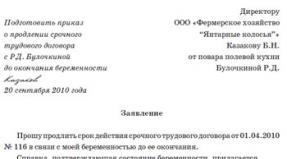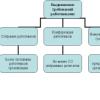Dismissal for loss of trust article of the trade code of the Russian Federation. Dismissal of an employee due to loss of trust. Who could face dismissal for loss of trust
Labor law provides for such a position as dismissal due to loss of confidence. What is it in reality and in what cases does the employer have the right to refer to this paragraph of the relevant article of the code? We invite you to familiarize yourself with the details of such a procedure.
What does the Labor Code say?
Before taking any action in relation to an employee, even if you intend to increase his salary or raise him in position, it is better to look into the code of labor laws and check if you are violating any provisions.
As for the termination of an employment contract due to loss of confidence, this is stipulated in the seventh paragraph of the eighty-first article. And literally the text reads "the commission of guilty actions by an employee directly serving monetary or commodity values", which already imposes restrictions on the employer - that is will be proven.
When registering the dismissal of an employee, this nuance must be taken into account.
Dismissal procedure for loss of confidence
If you are firmly convinced that your case falls within the scope of the Labor Code, and you are firmly confident that you can provide sufficient evidence to prove the employee's guilt, the procedure for dismissal will be approximately the same as in any other case when the initiative comes from the employer:
- the employee will be notified of the upcoming termination of the employment contract;
- an order will be issued for the enterprise;
- on the last working day, the employee will be issued with all the required documents and money.
Notification
A notice of dismissal in the event of a misconduct should not require a mandatory two-week period. If the employer discovers that the employee has committed a culpable act, he can fire him any day at his discretion.
The notice of dismissal of an employee due to a loss of trust must be in writing, and the employee must sign for its receipt. If he refuses to sign, an act is drawn up about this.
Order
On the basis of the established fact of committing a guilty misdemeanor in the enterprise, an order of the standard form T-8 is issued. The order must necessarily contain the same wording as will subsequently be indicated in the work book.
Payment
As in the general case, upon dismissal due to loss of confidence on the last working day, the employee is given everything that is due to him:
- a work book with a corresponding entry, which the employee certifies with his signature, as well as an entry in a personal card;
- a certificate of income for the last working year, which has recently become mandatory;
- salary earned by the employee up to that day inclusive;
- all bonuses, incentive payments and other money allocated according to the wage system established in production;
- compensation for unused days of annual calendar leave.
Of course, if the employee has already spent the vacation in advance, the previously issued vacation pay will be withheld from him.
Who could be fired for loss of confidence?
We remind you that the clause on lost trust applies to those employees who perform work related to the maintenance of valuables, cash or commodity. That is, all those employees who are listed in the Decree of the Ministry of Labor of the Russian Federation No. 85 of 12/31/2002 are all those categories with which it is necessary and possible to conclude agreements on full liability. For example, such employees include cashiers - because they directly deal with cash, but accountants are not such employees, since they carry out all transactions with funds only on paper.
If some employee performs the duties of an absent employee and makes a mistake, firstly, he must perform these duties regularly, and not one-time, and secondly, it will be necessary to prove that this is a deliberate action, and not just an accidental error that has arisen due to lack of competence.
Also, you cannot dismiss a team or several people if an agreement on full liability was concluded with all of them. A group of people under the seventh paragraph of the article cannot be dismissed, however, it is possible to be held liable, but another measure of punishment will have to be chosen.
Is it possible to execute dismissal for loss of confidence by court verdict
Not too often, as experience shows, but sometimes there are situations when an employee commits an illegal act not at the enterprise, but outside it. In this case, according to experts, the employee may also well be dismissed under the seventh paragraph of the eighty-first article. If a writ of execution came to the enterprise with a court verdict and an obligation to withhold part of the salary to compensate for damage, the employer may well cease to have confidence in such an employee. After all, if his hand went up to steal once, who can guarantee that this will never happen again?
And in order to prove the guilt of an employee with whom the manager terminated the contract on his own initiative, it will be enough just to give in the order a link to the writ of execution and pin a copy of it into the application.
What should be the amount for dismissal due to loss of confidence under the Labor Code of the Russian Federation

 The legislation, specifying specifically that the clause concerns only those who directly deal with material values and money, does not establish the exact amount, after the theft of which (or causing damage to which) the procedure for parting with the employee can be started. Thus, if the manager decides that the loss of five kopecks as a result of the employee's deliberate actions undermines his confidence in the latter, he has every right to start formalizing the dismissal: write a notice, prepare an order, send an order to the accounting department to prepare a calculation certificate, and so on.
The legislation, specifying specifically that the clause concerns only those who directly deal with material values and money, does not establish the exact amount, after the theft of which (or causing damage to which) the procedure for parting with the employee can be started. Thus, if the manager decides that the loss of five kopecks as a result of the employee's deliberate actions undermines his confidence in the latter, he has every right to start formalizing the dismissal: write a notice, prepare an order, send an order to the accounting department to prepare a calculation certificate, and so on.
At the same time, it is not necessary to wait for an employee to stumble several times or commit misconduct on a regular basis - just one case is enough to lose confidence.
But all of the above is also true: if the employee considers that such actions of the management in relation to him are unfair and goes to court, then he may win the case if the court considers the arguments of the former boss unconvincing.
How to fire an employee due to loss of trust? The timing
As with any termination of an employment contract, it is very important to meet the deadlines. According to labor law, it is considered that if, after the date specified in the order and the statement (or notification), the employee still continues to work and has not received either money or documents, then the contract with him is automatically extended. If the employee still needs to be fired, the whole event will have to start over.
In the case of a situation regarding the loss of trust, the manager needs not only to get rid of the employee, but also to receive compensation for the material damage caused. Therefore, it is important to ensure that the employee first receives a written warning that he will be politely "asked" from the enterprise, and then - on his last working day - receives the final payment. Even if the employee refuses to take what is owed or sign the notification, an act can be drawn up about this, but the manager must be sure that he has completed everything properly and on time - so the former employee will not have a reason to go to court.
For example, a situation is possible when an employee refuses to admit his guilt and writes a letter of resignation of his own free will. If, within two weeks, the manager does not dismiss him under paragraph seven of the eighty-first article, the procedure will be considered perfect under article eighty.
Dear Readers! Our articles tell about typical ways of solving legal issues, but each case is unique.
If you want to know how to solve exactly your problem - contact the online consultant form on the right or call +7 (499) 703-35-33 ext. 738 . It's fast and is free!
Dismissal due to loss of confidence must be legally justified. In Art. 81 clause 7 of the Labor Code of the Russian Federation specifies the provisions according to which the employer has the right to fire an employee due to lost confidence.
As a rule, persons with material responsibility (serving monetary or commodity values) are dismissed under this article. In accordance with the regulations of the labor code of the Russian Federation, not every employee can be dismissed from office under Art. 81 of the Labor Code of the Russian Federation.
An employer has the right to terminate an employment contract with a subordinate if he has committed illegal acts in relation to property for which he is financially responsible. Dismissal of an employee due to a loss of trust is often contested, since in the subjective sense of “victims” it is considered illegal.
There are times when an employee commits illegal actions outside of work and not in relation to colleagues and property for which he is financially responsible. The employer finds out about this and draws up an order to dismiss because of the lost confidence. In this case, the administration questions the integrity of the employee. If you wish, you can resign yourself.
Dismissals due to loss of trust are common, but in order to accuse a particular citizen of dishonesty, it is necessary to record the fact of theft, theft, bribery (or an attempt to carry out a malicious act). On the basis of clause 7 of Art. 81 of the Labor Code of the Russian Federation, the administration can deprive a citizen of work, whose illegal acts were carried out at the workplace.
Dismissal due to loss of confidence is a legal measure for employees who have violated the provisions of the employment contract on material liability. The legality of the actions of the administration in this case is established by the court if the “victim” has filed a claim. It is believed that accountants, economists, markers, cleaners cannot be fired due to a loss of trust. If this happens, the injured party has the right to go to court for reinstatement in the previous position.
A resigning employee, in the event of a complaint from the administration, needs to draw up an explanatory note. This will help establish the citizen's guilt for malicious acts. The employer must draw up an order and notify the employee about the dismissal within 3 days. Compliance with the sequence of these steps is mandatory.
 The employer must not pull. The procedure for dismissal, for appropriate reasons, must be followed. If the illegal acts that caused the loss of trust were not committed at the workplace, you need to understand the situation in more detail.
The employer must not pull. The procedure for dismissal, for appropriate reasons, must be followed. If the illegal acts that caused the loss of trust were not committed at the workplace, you need to understand the situation in more detail.
There are cases when an employee goes to court with a claim to return to the previous place and to pay moral damage from the administration. For example, he committed some suspicious or illegal act, and the employer fired him after several months. During all this time, the citizen went to work and received a salary.
Perhaps the employer knew about the misconduct, but delayed the dismissal. If the court establishes that a particular citizen fulfilled his duties and did not make him doubt his good faith, the claim for return to the previous workplace and compensation for moral damage will be satisfied.
Conditions for dismissal under Art 81
On the basis of clause 7 of Art. 81 of the Labor Code of the Russian Federation. financially responsible persons fall into this category. Their activity can be associated with the reception, issuance, recalculation of commodity values (or funds). In most cases, the employer enters into a liability agreement with the employee. Judicial practice shows that in the absence of a contract, dismissal due to loss of confidence can be implemented.
 The reason may be a violation of the rules for transporting or sending goods, theft of materials or machines intended for the stable operation of an enterprise, illegal transactions with funds, etc. At any enterprise and in any organization there are employees who are not financially liable.
The reason may be a violation of the rules for transporting or sending goods, theft of materials or machines intended for the stable operation of an enterprise, illegal transactions with funds, etc. At any enterprise and in any organization there are employees who are not financially liable.
Upon loss of confidence, as a rule, collectors, cashiers, loaders, drivers, merchandise managers are fired. An accountant or economist may not fall into this category, it all depends on the situation. Dismissal under the article “Loss of confidence” is a complex and multifaceted process. It is important for an employer to know the provisions of the Labor Code of the Russian Federation and the duties of a particular employee.
In what cases is dismissal illegal?
There are many cases when an unjustly dismissed employee goes to court and the authorized bodies satisfy his claim. Example: citizen Petrova worked as an accountant in a bank. A criminal case was opened against her. Based on Art. 170 of the Criminal Code of the RSFSR Petrova was removed from her duties as an accountant. Deputy the chairman of the institution created an order for the dismissal of this citizen on the basis of paragraph 2 of Art. 254 of the Labor Code of the Russian Federation.
The victim filed a lawsuit in order to recover at the workplace. At first, the claim was rejected, then the judicial board for civil cases satisfied her protest and created a decree on the restoration of Petrova to her previous position. In accordance with clause 7 of the regulation on chief accountants, approved by the decree of the Council of Ministers of the USSR dated January 24, 1980 No. 59, Petrova was illegally dismissed. The employer does not have the right to impose material responsibility on the accountant for money and values.
When is the dismissal justified?
 In the legal literature there is a list of professions whose representatives cannot be fired due to loss of trust. A typical representative of a materially responsible person is a merchandiser. If he accepts and keeps records of products, then material responsibility is imposed on him. The drivers who carry passengers and receive funds are also financially responsible persons. In case of violations, they can be dismissed under Art. 81 clause 7 of the Labor Code of the Russian Federation.
In the legal literature there is a list of professions whose representatives cannot be fired due to loss of trust. A typical representative of a materially responsible person is a merchandiser. If he accepts and keeps records of products, then material responsibility is imposed on him. The drivers who carry passengers and receive funds are also financially responsible persons. In case of violations, they can be dismissed under Art. 81 clause 7 of the Labor Code of the Russian Federation.
Example: citizen Sidorov worked as a driver at a trucking company. The administration created an order, on the basis of which he was dismissed in accordance with paragraph 2 of Art. 254 of the Labor Code of the RSFSR. The citizen considered that the dismissal procedure in this case is illegal.
A couple of days later, he filed a lawsuit to reinstate his former position and receive a salary for forced absenteeism. The Judicial Collegium dismissed the claim. Sidorov filed a complaint with the cassation service. This complaint was dismissed.
Based on paragraph 2 of Art. 254 of the Labor Code, an employer can dismiss an employee who improperly serves monetary or commodity relations (for example, receives additional income). It was found that Sidorov violated the rights of passengers by taking free riders on the bus. One of the passengers wrote a complaint to the administration of the transport company. Thus, Article 81 of the Labor Code of the Russian Federation came into force.
In this case, the driver entered into an agreement, according to which he not only drives the transport, but also serves passengers and charges them a fare on the basis of established rules. Qualified workers serving material assets also bear financial responsibility. The employer, before deciding to dismiss under Art. 81, must analyze the labor function of the employee.
Dismissal of a qualified employee
 Citizen Prokhorova worked as an engineer in the supply department. For 3 years she performed her duties impeccably. The administration decided to fire Prokhorova for violating her obligations. The basis was Art. 254 of the Labor Code of the Russian Federation. The reason for the dismissal is the loss of trust. Prokhorova considered such actions illegal and filed a lawsuit.
Citizen Prokhorova worked as an engineer in the supply department. For 3 years she performed her duties impeccably. The administration decided to fire Prokhorova for violating her obligations. The basis was Art. 254 of the Labor Code of the Russian Federation. The reason for the dismissal is the loss of trust. Prokhorova considered such actions illegal and filed a lawsuit.
The lawsuit contained a request to reinstate him to his previous position and pay salaries for forced absenteeism. In the course of the proceedings, the court established that material responsibility was imposed on this citizen.
The administration fired her after checking the fuel accounting. The supply service revealed a shortage of diesel fuel. Engineer Prokhorova was unable to provide reports on fluid consumption. The plaintiff herself claims that the company did not develop a job description, on the basis of which the court could recognize the dismissal as lawful.
The authorized bodies refused to satisfy Prokhorova's claim. The dismissal for lack of confidence was recognized as lawful, since the civilian was entrusted with financial responsibility, and the terms of the contract on her part were violated.
What is considered misconduct
Dismissal of an employee due to loss of trust occurs for various reasons. If he illegally receives payment for a certain product, provides services, for example, sells goods from a warehouse or from ancillary premises, the administration has the right to fire him on the basis of a violation of an employment contract. Unlawful acts also include weighing, deceiving consumers, bribery, violation of the rules for working with cash registers.
Trust is the conviction of one person in the honesty and decency of another. There are many reasons to doubt a person. When an employer hires a particular citizen and imposes financial responsibility on him, he, as a rule, is confident in decency. If an employee does not follow specific rules, he causes (or risks to cause) damage to the enterprise
Intentional and unintentional motives
Dismissal due to mistrust happens often. Before deciding to fire a particular citizen, you need to understand the intent of the act that damaged the enterprise. The same action can be performed on purpose or without malicious intent (negligence).
The administration must correlate the actions of the employee with the norms of behavior regulated in the contract. The guilt of a citizen can be direct or indirect. If a person deliberately committed an act that damaged the enterprise, he is considered a direct accomplice of the malicious act. If this citizen has not prevented the malicious acts, he is considered an indirect accomplice.
Dismissal for loss of confidence is often associated with negligence - a phenomenon when an employee does not take his duties seriously enough. In this case, he can ignore important rules and regulations. For example, if an employee who is financially responsible does not store money, goods, or improperly use equipment or storage space, the employer has the right to fire him due to loss of confidence. The employer has the right to release an employee from his position for the fact that he inappropriately stores keys or speaks out loud facts about which it is better to remain silent.
An employee who leaves a safe open can easily be accused of negligence. Such an act may be considered malicious. If an employee has the goal of stealing money and deliberately leaves the safe open, then he is pursuing his own selfish goals. Sometimes it is difficult to distinguish between negligence and wrongfulness. To accuse a citizen of intentionally committing an action, you need to have evidence (for example, video). Wrongful actions are supported by various motives: some - by self-interest, others - by enmity and anger. Criminal acts can be caused by hatred of management and employees.
In the absence of a motive for the crime, one can judge of negligence, that is, a specific action was committed through negligence. Interpreting the actions of an employee is not easy. The employer must reasonably express his point of view to the dismissed. A suspect in a malicious act must confirm in writing his actions, indicate the involvement of other persons (if any). If it is established that the employee is not guilty of committing a specific action and the shortage arose through the fault of the employer, who did not provide proper storage conditions for the goods, it will be impossible to dismiss under Article 81 of the Labor Code of the Russian Federation.
In conclusion, it should be noted that trust is a subjective concept. In judicial practice, there are many cases when an employee is unlawfully dismissed, allegedly due to a loss of confidence. If a citizen believes that he lost his job unfairly, he has the right to file a claim against his employer. The court will mainly establish what was the basis for the loss of confidence in a particular citizen and whether the dismissal is legal under Art. 81 of the Labor Code of the Russian Federation.
Jul 24, 2017 zakonadmnin
Who can be fired and in what time frame due to loss of trust? What documents do the employer need to complete? What is the procedure for saying goodbye to a disappointed employee? We will talk about this in the article.
Dismissal of an employee due to loss of confidence in him (clause 7, part 1 of article 81 of the Labor Code of the Russian Federation) allows the employer to “weed out” unscrupulous specialists. However, in practice, dismissal on this basis is not often carried out. The reason lies not in the absence of personnel, whom the employer does not trust, but in the rather cumbersome procedure for processing all the necessary documents. But if there is a clear algorithm of actions, it will not be difficult to fire an employee who is no longer trusted in the organization.
Who can be fired?
Termination of an employment contract due to loss of confidence is possible only with a certain circle of employees. So, in paragraph 45 of the Resolution of the Plenum of the Supreme Court of the Russian Federation of March 17, 2004 No. 2 (hereinafter - Resolution No. 2) it is indicated that only employees who directly serve monetary or commodity values (reception, storage, transportation, distribution, etc.). These include: cashiers, storekeepers, freight forwarders, accountants, cashiers, warehouse managers, etc.
At the same time, the condition that these employees committed guilty actions that served as a reason for the loss of trust in them on the part of the employer must be met. Such dismissal is possible regardless of whether an agreement on full liability is concluded with employees serving monetary or commodity values or not. It also does not matter what kind of work duties the maintenance of valuables belongs to. On this basis, the dismissal of pregnant women and other employees during their temporary incapacity for work or during vacation is not allowed.
Guilty actions
The labor legislation does not contain a list of actions, the commission of which may serve as a reason for the loss of confidence. Therefore, the employer must independently determine which actions of the employee really undermine his credibility. In practice, these are most often referred to as: the use of the company's property by a specialist for personal purposes, fictitious write-off of goods and valuables, violation of cash discipline, theft, loss or destruction of property entrusted to an employee, violation of the rules for storing and issuing material values, receiving and issuing money for services or goods without proper paperwork, weighing, counting, measuring, body kit, shortage, etc.
It should be noted that the establishment by management only of the fact that an employee has committed the above actions cannot serve as a reason for dismissal due to loss of confidence. So, termination of the contract on this basis can only take place if there is evidence of the employee's guilt. If the company has only suspicions, or it is impossible to prove guilt, then dismissal due to loss of trust will be illegal.
Dismissal procedure
Clause 47 of Resolution No. 2 states that actions committed by an employee at the place of work and in connection with the performance of his job duties, which give rise to a loss of confidence in him, should be considered as a disciplinary offense. Consequently, a guilty specialist can be dismissed only if the procedure for the application of disciplinary sanctions is observed, which is enshrined in Article 193 of the Labor Code. Therefore, the dismissal must be made within the time limits established by this rule:
- no later than one month from the moment the misconduct was discovered (periods of being on sick leave and on vacation are not included in this period);
- no later than six months from the date of the misconduct (if violations are revealed during the audit, audit, then no later than two years).
During these periods, management needs to prepare all documents. And you should start with the registration of the fact of detection of actions that give rise to the loss of confidence.
The legislation does not contain the form of a unified form, which must be drawn up in such cases. Therefore, the fact of committing guilty actions can be recorded in a memo, memo, etc. The document must contain the following information: the employee who discovered the fact of committing illegal actions, the circumstances of identifying the guilty actions, the date and time of the event, if known.
An employer with such a document can initiate an internal investigation, the purpose of which will be to identify the culprit and collect evidence.
To conduct an investigation, you need to create a special commission of employees of the organization (at least three) who are not interested in the final result of the audit. The procedure must be formalized by an appropriate order, which indicates: the date and purpose of the creation of the commission, its validity period, full name. and the positions of the employees included in its composition, as well as their powers. All members of the commission must be familiarized with this order against signature.
During the investigation of the circumstances of the misconduct, employees who are part of the investigation team must establish the fact of the commission of illegal actions, including the time, place and method, for example, fictitious write-off of goods; determine the cost of the damage caused, find out which of the employees committed the unlawful act, establish the degree of their guilt and collect the necessary evidence. Also, the commission members are responsible for keeping all materials of the internal investigation.
After that, it is necessary to obtain written explanations from the offending employee (Article 193 of the Labor Code of the Russian Federation). To request such paper, it is better to issue an order and give it to a specialist against signature.
If the employee evades receiving an order, then the document can be sent to his address by registered mail. The employee must submit an explanatory note within two working days from the receipt of the document. If no explanations are provided, then this fact must be recorded in the appropriate act.
The absence of an explanatory letter does not affect the employer's right to fire an employee on the basis of a loss of confidence.
After the end of the investigation, an act is drawn up, which must contain: the date of the composition of the commission, the basis for the investigation, a description of the culpable actions committed by the employee, the degree of his guilt, a list of collected evidence, a link to the fact that the employee’s actions are grounds for the loss of trust in him on the part of the employer and the penalty to be applied (eg dismissal).
The act is signed by all members of the commission. It is also necessary to familiarize the employee with whom the investigation was carried out with the document - he must be familiarized with the decision of the commission against signature. If the offender refuses to put his autograph or evades this, then a corresponding mark is put on the act.
Next, two orders should be issued. First, an order to apply disciplinary action in the form of dismissal. It can indicate: the basis for issuing the order; FULL NAME. and the position of the employee; the action taken by the employee; clauses of an employment contract or job description that have been violated; type of disciplinary action.
The employee should be familiarized with this document against signature within three working days from the date of its publication (this period does not include periods of absence of the guilty person at work). If the specialist refuses to sign the order, then a corresponding mark is put on the document.
Secondly, the order of dismissal in the form N T-8 (approved by the decree of the State Statistics Committee of the Russian Federation of 05.01.2004 N 1) or in the form established in the organization. If the employee refuses to sign the order, the following entry can be made in the document: “I.R. Sokolov is familiar with the order, he refused to sign ”. An entry is made in the work book that the employee is dismissed on the basis of clause 7 of part 1 of article 81 of the Labor Code.
An employer, upon dismissal of an employee due to a loss of trust, is not obliged to follow the procedure for imposing a penalty and conduct an investigation if the guilty actions were not committed in connection with work. Dismissal in this case can be made within a year from the moment the company learned about the misconduct.
Now they have no such right. When you need to get rid of someone, he is simply offered to leave of his own free will. If he refuses, set a trap. They consider him late, smoke breaks, absence from the workplace. Or, for example, they are sent on a business trip without a written order, and then they formalize absenteeism.
But it rarely comes to that. Any reasonable person understands: it is better to leave of your own free will than under an article that will then interfere with finding another job all your life.
The ability to fire "for the loss of confidence" is needed by business rather for people who are unreasonable. Such that they will take a bite of the bit and let's butt: complain to the prosecutor's office, conduct legal proceedings.
In addition, the “loss of trust” is needed to tag people who trade in the secrets of the company, discredit it with inappropriate behavior.
One dismissal due to loss of trust - and the person has a "black mark". Another company, before hiring it, will think a hundred times if it's worth it.
Such explanations are given by business representatives who are lobbying for the need for a new article in the Labor Code.
However, it is not that new. “Loss of confidence” as a reason for dismissal is present in the Labor Code of the Russian Federation in the form of Article 81, but only applies to civil servants. Police officers, for example, or supervisory officials.
Labor relations experts argue that it is most often applied to those who “do not share”.
An employee of the supervisory authority checks, for example, the store - technical requirements, fire exit, electrical connections. Finds disorder. He is offered a bribe so that he does not write the act. He takes a bribe and in an amicable way must, of course, take most of it to his superiors. And he squeezes a bribe. Rattle. One time he squeezes, another, a third ... The authorities sooner or later find out about this and lose confidence in him.
It is troublesome to prove in court that he is a bribe-taker in order to prosecute him. Moreover, it is not known what circumstances will emerge in the course of the investigation: you see, they will also be taken out to the chief himself. Therefore, “loss of trust” in this case is the optimal solution. The well-built system of collecting money remains intact, and the flabby link is repaired: a dishonorable field employee is replaced by a decent one.
In this case, the words "decent" and "dishonest" must be taken, of course, in quotation marks. But in our wild market reality, where absolutely everything is built for money, the initial meaning of these words is already somehow confused. Forgettable.
What is decent and what is dishonorable? For what - to trust, and for what - not to trust?
And what should be a priority for a hired employee? Honesty towards the whole community? To people, to your people? Or honesty towards your boss? Or honesty towards the boss of the boss?
From these questions the head is spinning.
Well, for example, the situation. A commercial firm produces drugs in violation of the technology. Something overheats a little, and the drugs no longer work as they should. Do not heal.
If an employee of the company tells law enforcement officers about it, or even worse! - The media, he is guaranteed to lose the employer's trust: he gave away a trade secret! He will be fired immediately. Will remain with a "black mark". Although humanly he was absolutely right and much more trustworthy than his employer, a businessman.
How to resolve such collisions?
Probably, in the new article of the Labor Code, it should be indicated whose trust should be lost for dismissal. The immediate boss? Or the prosecutor's office? Or the whole society?
The chairman of the Federation of Independent Trade Unions, Mikhail Shmakov, called yesterday the proposals of business to introduce a new article on the loss of confidence in the Labor Code of the Russian Federation, pointing out that amendments of this kind must be discussed with the federation at a tripartite commission.
It is not a fact that the discussion will actually take place. But about the "nonsense" Shmakov is definitely not right.
Businessmen, like any employer, need legalized leverage that allows them to quickly and efficiently get rid of employees who do not share their business interests, but pursue their own. This is not nonsense, this is reality.
Such levers are always purely about money.
They have nothing to do with trust, decency, honesty and other highly moral categories. Whatever you call them.



















